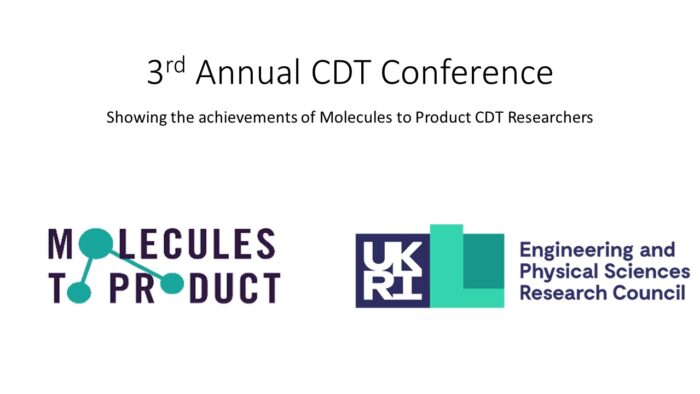CDT Annual Conference 2023

The EPSRC Centre for Doctoral Training in Molecules to Product 3rd Annual Conference took place on Wednesday 12th and Thursday 13th July 2023, at Weetwood Hall, Leeds.
Please click below to view our conference flyer with agenda details:
Molecules to Product Conference Flyer 2023
Speaker Biographies

Primary Speaker
Professor Peter Dowding - Infineum
Unlocking the molecular-level properties of commercial oil additives through collaborative research
Pete Dowding was appointed Chief Scientist at Infineum in 2016 acting as leader for the collaborative academic portfolio (currently ~45 projects) and for background/ fundamental studies of additives for future generations of lubricants and new business areas. Pete is responsible for bringing new science and analytical techniques into the company.
He has research interests in surfactant design/ self-assembly, computational modelling of structure/ performance relationships and characterisation techniques, particularly application of x-ray and neutron scattering to industrial systems. He has acted as industrial supervisor to >20 past/ present PhD students and 11 Post-Doctoral Researchers. He has secured over £2 million of external research funding for from UK and EU bodies. Pete holds 12 patents and has published >30 peer-reviewed papers and contributed to two books.
Pete currently holds the positions of Visiting Industrial Professor at Bristol University and Honorary Professor at Leeds University and is a Visiting Scientist at Diamond Light Source. Pete was awarded the RSC/ SCI McBain Medal for Colloid and Interface Science in 2009 and the RSC Inspiration in Industry Award in 2014. He is a Fellow of the Royal Society of Chemistry and a Chartered Chemist & Chartered Scientist. Pete is an active member of RSC and SCI: serving twice on Faraday Council and as Chair, Treasurer and Honorary Secretary for the Joint RSC/ SCI Colloid Group.

Key note Speaker
Professor Anthony Green - University of Manchester
Building enzymes with new function
Following his PhD in synthetic organic chemistry (total synthesis) under the supervision of Prof. E. J. Thomas, Anthony began postdoctoral research with Prof. Nicholas Turner and Prof. Sabine Flitsch based in the Manchester Institute of Biotechnology (MIB). Following a postdoctoral research position with Prof. Donald Hilvert at ETH (Zurich), Anthony started his independent research career in 2016 based in the Manchester Institute of Biotechnology (School of Chemistry) at the University of Manchester, where he is a professor of organic and biological chemistry, a BBSRC David Phillips research fellow and holder of an ERC consolidator grant. His research interests lie in the design and evolution of enzymes with new function.

Key note Speaker
Graham N Newton - University of Nottingham
Encapsulated nanoscale metal oxides as ultra-stable redox materials and efficient electrocatalysts
Graham N. Newton obtained his Ph.D. from the University of Glasgow (UK) in 2009. After carrying out a JSPS postdoctoral research fellowship he was appointed Assistant Professor at the University of Tsukuba, Japan, in 2011. In 2015 he moved to the University of Nottingham, UK, where he is now Associate Professor of Inorganic and Materials Chemistry and a leader of the Nottingham Applied Materials and Interfaces group. His research interests include the synthesis and characterisation of redox-active materials, from molecular systems through to complex nanomaterials. He has a particular interest in the development of organic–inorganic hybrid molecular metal oxides for applications in energy storage and photocatalysis
Careers Panel Members Biographies
Dr Ceri Williams 
Dr Ceri Williams has a first degree in Biological Sciences and a PhD in Chemical Engineering. She worked as an academic and ran an Environmental Engineering Research Group at the University of Sheffield. She left academia to work in the private sector and then in Yorkshire Forward, the regional development agency, where she led programmes to drive value creation from academic industry collaboration.
She joined the University of Leeds in 2007 and held a number of Director roles leading strategic programmes including Innovation Director for the Medical Technologies Innovation and Knowledge Centre and she led the business case for the development of Nexus. In 2015 she was appointed as Director of Research and Innovation Development at the University of Leeds. In that role she led a team of Research and Innovation Development professionals that worked with academics and external partners to develop research and innovation proposals that aligned with external funding opportunities, addressed market demand and built upon research capability. This included working with researchers in fundamental and applied research, supporting interdisciplinary collaborations to address complex challenges and securing investment to translate proven science into technologies that delivered societal and economic benefits.
Ceri left the University in March 2023 and is now a self-employed consultant providing strategic leadership and research and innovation advice to universities and to companies. Ceri has a strong track record in economic development, research and innovation policy and strategic leadership of economic and social value creation from universities and their partners. She was a member of EPSRC’s Strategic Advisory Network and Chair of the Non-Executive Board of the National Biofilms Innovation Centre. She has particular interest in supporting effective research translation to progress proven science into validated technologies to address defined market opportunities through proof of concept, proof of market and other translation investments. These approaches will help build confidence for companies and other partners to progress these opportunities to new products, services, processes and policies that will positively impact in society and the economy. She has a strong background in strategy development is also interested in helping build leadership skills and the confidence to develop and implement new initiatives.
Ceri is a Trustee of the Yorkshire Wildlife Trust and is passionate about wildlife and the natural world. She lives in Ilkley and is enjoying rewilding the garden, watching local wildlife and spending time outdoors walking and cycling.
Dr Charlotte Bell 
Charlotte works as Senior Business Partnerships Manager in the Business Partnerships Office, Medical Sciences Division. She supports the Director of Business Partnering and promotes strong links between the division and businesses in order to secure significant funding and resources to drive collaborative research and provides dedicated partnership management for key strategic university-business relationships, including Bristol Myers Squibb with whom she has been working with for 5 years. Charlotte manages, trains and supports the development of other Business Partnerships Office team members and leads on progressing a portfolio of new partnering opportunities alongside the development and implementation of strategies to increase business collaborations.
Prior to joining the team at Oxford she worked at the University of Bristol in the Knowledge Exchange and Commercialisation team focusing on impact development and industry engagement in Biomedical Sciences. She spent 3 years at the Biotechnology and Biological Sciences Research Council (BBSRC) where she managed collaborative funding mechanisms including the Industrial Biotechnology Catalyst and Research Industry Clubs in Bioprocessing, Biorefining, Animal Health and Horticulture. Charlotte obtained her Engineering Doctorate in Biopharmaceutical Process Development from Newcastle University, working in collaboration with GlaxoSmithKline.
Dr Helen Blade 
Helen graduated from Liverpool University with a PhD under Prof. Matt Rosseinsky in the field of functional materials, linking the crystal structure of a material to its properties. Helen joined AstraZeneca in 2007 and has continued in the field of developing structure – property relationships. Working as an associate principal scientist in structural science she has led the establishment in the application of using crystal structures to predict and explain the solid form and particle properties of pharmaceutical materials.
Dr Rachael Shinebaum 
Rachael graduated with an MPharm from Aston University in 2007 and spent eight years as a community pharmacist before embarking on an Engineering Doctorate at the University of Birmingham. Her research was focused around moisture uptake in pharmaceutical excipients and resultant flow and compression characteristics. Since joining AstraZeneca in 2020, Rachael has worked as a Senior Scientist in Materials Science within late stage development. Working predominantly on paediatric formulations, Rachael has maintained her interest in excipients and bulk powder characterisation while also taking a keen interest in product acceleration.
Professor Rik Drummond-Brydson 
Rik graduated from the University of Leeds with a BSc Joint Honours in Chemistry and Maths in 1985. He graduated from the University of Cambridge in 1988 with a PhD in Physical Chemistry using electron microscopy and spectroscopy, with a number of visits to different labs including the Max Planck Institute in Berlin and a 1 month student exchange with Japan. After considering career options, Rik applied for and was awarded a smaller (3 year) named Royal Society Research Fellowship. From there, he moved as Postdoctoral Fellow to Physics at Imperial College London to study modelling but kept up experimental work in collaboration with Max Planck Stuttgart and National Physical Labs and later got the fellowship extended for 2 years and moved to Materials at the University of Oxford. After many lectureship applications, Rik was awarded a lectureship at Materials at University of Surrey in 1992. He took up a tenure track University Research Fellowship at Materials Leeds in 1996 to concentrate more on research. Rik has been at the University of Leeds ever since, and has slowly built a research group and coordinates the interdisciplinary Electron Microscopy (LEMAS) Centre. Rik also leads the SuperSTEM aberration corrected microscopy consortium at Daresbury Laboratories in Cheshire, is currently a member of Executive Board of the European Microscopy Society, a member of Council of the Royal Microscopical Society, and a former Chair and also Secretary of the EMAG group of the Institute of Physics.
